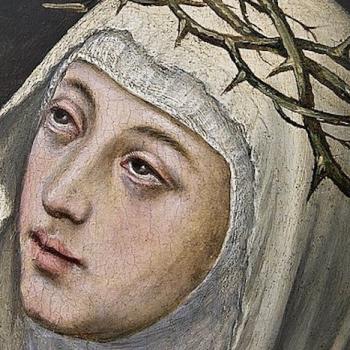
It’s easy to trust the God of light. I am learning to trust the God of darkness.
Why God Loves Metaphors
God is light. God is darkness. Both of those images, of course, are metaphors. Scripture contains more metaphors than I can count. In one of my favorite passages from Thomas Aquinas (OK, I have several), he asks whether this is appropriate. Shouldn’t Scripture just tells us the truth in plain language?
No, Thomas answers his own question. Metaphor is the right language for limited creatures like us, whose imaginations need capturing. God invites us into truth by giving us an image we know and asking us to imagine what we don’t. God, all these metaphors suggests, is like something you know. But differently.
The Light and the Dark
In her new lectionary, or collection of scripture readings appointed for each Sunday, Bible scholar and Episcopal priest Wil Gafney suggests some new ways of translating metaphorical darkness in scripture. When the sense of the image is our ignorance, as in “through a glass darkly,” she’ll use a term like “obscurely.” When it’s about evil intentions, as in “men loved darkness because their deeds were evil,” she looks for other imagery to help us out.
Gafney makes these choices because, as she says, “We are taught from a young age that everything light and white is good and everything dark and black is bad.” This means, globally, it’s difficult for us to read the metaphors of a text written where colorism barely existed. In first century Palestine, most skin color ranged from brown to black. By contrast, many early modern English and American commentators made an explicit association of biblical “dark” to skin and race. Darkness is evil; Africans are savage.
When we forget, collectively, that a phrase like “God is light” is a metaphor, it becomes what another scholar calls a “dead metaphor.” (Which, if you’re keeping score at home, is also a metaphor!) It can’t do the work that Thomas said God wants scripture to do in us, because it no longer fires our imagination to see what is true in a statement that is obviously not, literally, true. In fact, it can do much damage, as this one has.
The God of Darkness
In cases like this, it may help to surprise ourselves with a contrasting metaphor. We lose something when we lose light as a metaphor. And what we lose, Gafney helps me see, is the God of darkness.
If God simply IS light, then John 1:5 is telling us a literal truth: darkness is godlessness. But consider the presence of God in Exodus:
- Then the Lord said to Moses, “I am going to come to you in a dense cloud, in order that the people may hear when I speak with you and so trust you ever after.” (19:9)
- Then the people stood at a distance, while Moses drew near to the thick darkness where God was. (20:21)
In neither passage is darkness evil or even obscurity. Rather, God simple abides in it. This fits the story of a God who made both the light and the dark, gave names to them, and called them “good.”
As a metaphor, again, the point is not to categorize the divine nature, but to find the imaginative invitation in the image. Howard Thurman and Gregory of Nyssa both celebrate the image of the dazzling or luminous darkness of God. Gregory says that what Moses entered was the limitless infinity of God. An expanse in which the lack of clarity was in fact an invitation to keep desiring. “This truly is the vision of God: never to be satisfied in the desire to see him.”
Darkness keeps us alive to what we have not yet seen. Our journey into God, Gregory says, is like that. It’s always like that: even the saints in heaven continue to tread joyfully into the darkness atop Sinai.
Darkness: My Divine Companion
The metaphor of divine darkness has become a close companion to me. (That is perhaps a surprising way of receiving the heavy ending of Psalm 88!) I am prone to optimism, which means I can get rattled when things don’t turn out well. I’d prefer for God to be light beyond darkness. The kind where I can see all there is to see and not be surprised by shadows.
But God, Thurman and Gregory and life itself is teaching me, is not simply light beyond darkness. That God is an idol. Or perhaps I should say I am tempted to make my own optimism into an idol.
God is beyond the contrast of light and dark. God is a light too bright to see and a darkness that glimmers with presence. My moments of clarity have unseen shadows within them. My moments lost in the dark are invitations to new ways of seeing.
It’s easy to trust the God of light. I am learning to trust the God of darkness.
The metaphor of darkness is teaching me, slowly, what it is to love the God whose nature is infinite, and whom I can trust in both the day and the night. God will light up each night with a fire, and God will always darken each day with a cloud. And somewhere, in all those metaphors, I find myself invited to keep trudging alongside Moses and the Israelites. Even when—especially when—I have no idea what lies ahead.










